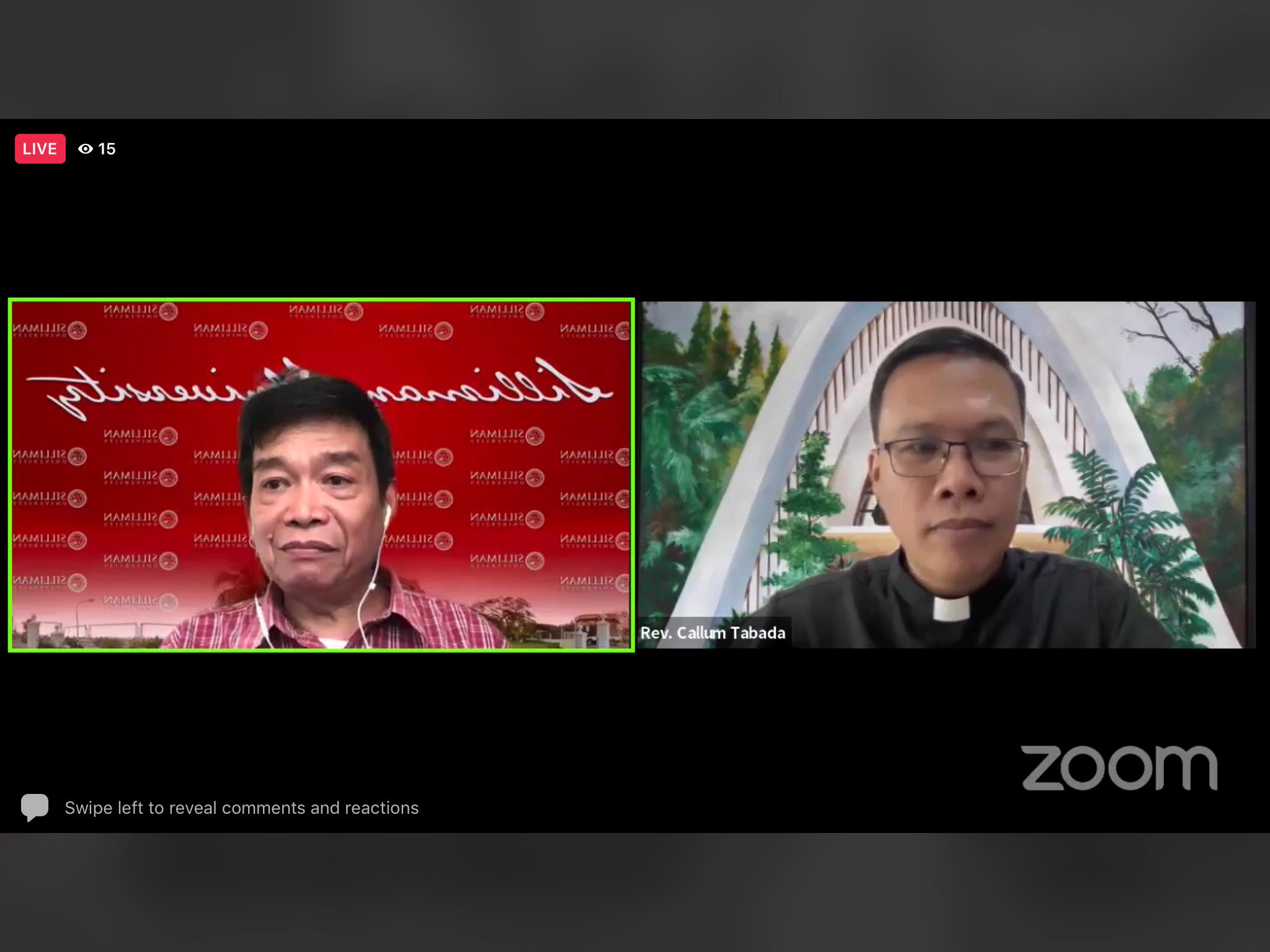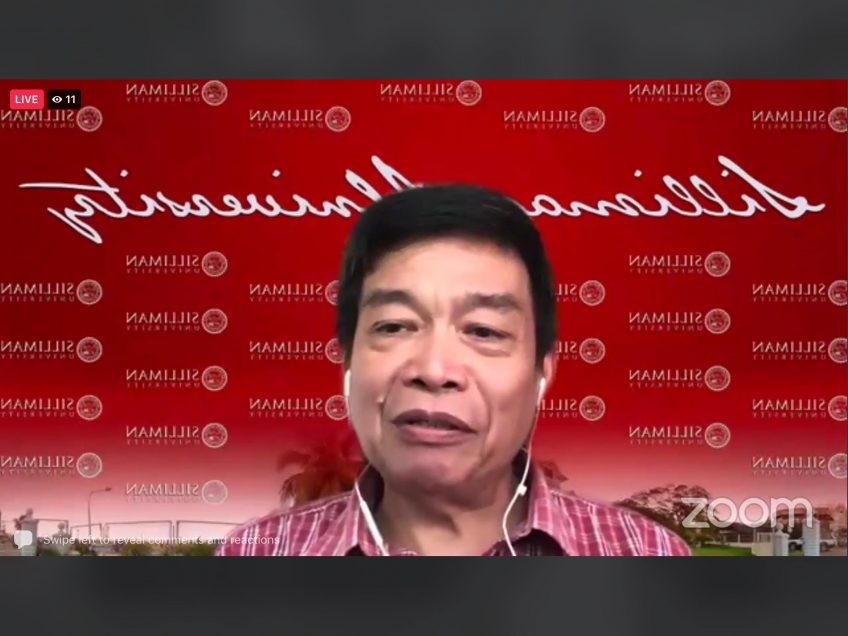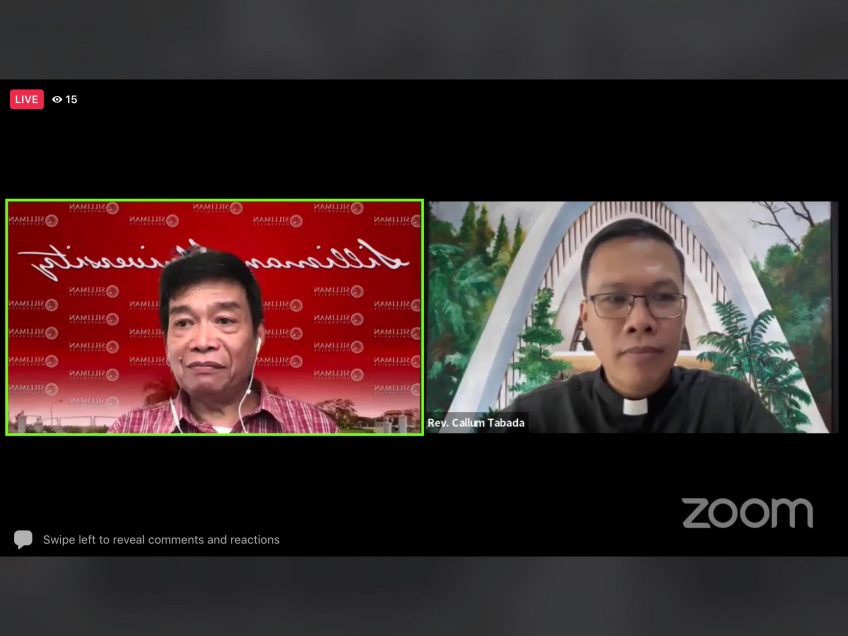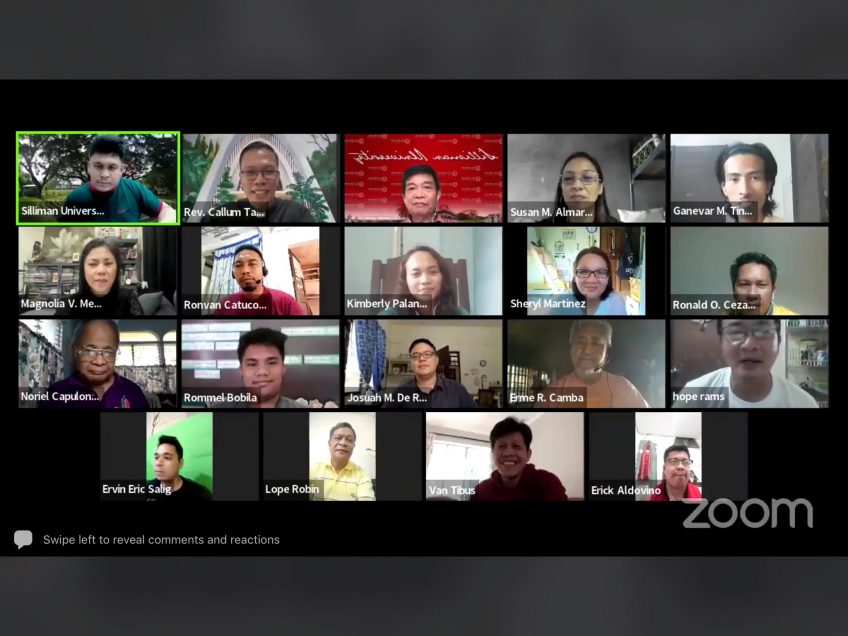
Divinity School professor retells EDSA narrative, challenges churches to ‘ensure social justice & good governance’
“Churches and Christians ought to seriously study laws, programs, advocacy and practices of elected officials which the Church can support and extend principled partnership to ensure social justice and good governance,” shared Dr. Victor R. Aguilan, a church history and ethics professor from the Silliman University Divinity School, during a webinar held February 23, 2022 via Zoom and Facebook Live.
Titled, “Remembering EDSA to Move Forward: A Challenge to the Church,” the webinar emphasized the narrative of the Philippine churches’ during the early years of Martial rule by the dictator, former President Ferdinand Marcos, and the challenges Filipino Christians and the institutions must respond to at present.

Challenge to the Church
Aguilan then enumerated several challenges for the Church today while remembering EDSA People Power Revolution which includes the continued upholding of human rights, advocating of just peace in various levels, and reminding the faithful “to be informed voters and to vote with our convictions, not our wallets, and narrow self-interests.”
“Churches must work with movements and groups involved in genuine land reform, peace and human rights advocacy, environmental protections, community-based health programs, and basic Christian communities. This implies their being aligned with peasants’ movements, labor unions, urban poor organizations, and other sectoral groups struggling for social justice,” shared Aguilan during the said webinar.
For Aguilan, joining these groups and organizations would mean utilizing members from the churches who have the talent and skills in rendering a wide range of public service. Only the Church, he added, has the power to motivate and identify these people who are hidden and unrecognized in the congregations.
“By encouraging people to organize and participate in decision-making in the government, the Churches and the people are exercising a critical vigilance relative to the use of power by government officials,” said Aguilan.
As the elections near, Aguilan left a challenge to churches for them to pray for those in government and for those who aspire to seek public office. For him, “Praying for political officials is a reminder to all of us that God is the source of all powers and authorities (Rom 13:1). A reminder that we should ‘not put your trust in princes, in mortal men, who cannot save’ (Ps146:3).”
Along with prayer, Aguilan calls the churches to move into action quoting the Scripture text from James, “faith without work is dead” and so he exclaimed, “And prayer without action is just noise.”
Behind the challenges, there are lessons that would need to be retold and taught to this generation and Aguilan enumerated the following: the rejection of authoritarianism, militarism, extrajudicial abuses, crony capitalism, and corruption.
Remembering EDSA
In celebrating EDSA People Power’s anniversary this year, he recalled added lessons of the past experiences as a nation are as follows: restoration of political democracy to economic democracy, re-establishment of civilian rule over the military to end impunity, defense of civil and political rights to the realization of economic, cultural and social rights and the promotion of clean and good governance to the widening people’s participation.
On the other hand, Aguilan began his narrative of events leading to EDSA People Power by stating that at first, during the early years of the Martial Law which was proclaimed in 1972, the United Church of Christ in the Philippines (UCCP), other member churches of the National Council of Churches in the Philippines (NCCP) including the Iglesia Filipina Independiente and the United Methodist Church were silent because they gave Marcos a chance to solve the problems of lawlessness, criminality, violence, and poverty. Even the Roman Catholic Church was silent because Martial Law was projected as a smiling regime.
But in 1974, during the UCCP General Assembly, UCCP released a statement that warned the members and the government about the dangers of abuses during Martial Law. Aguilan said that in the years that followed, Marcos revealed his authoritarian character and the human rights atrocities worsened with many church workers who expressed dissent being jailed, tortured, and persecuted. Due to this worsening socio-political condition, the UCCP General Assembly in 1978 demanded the restoration of civil and political liberties and the immediate dismantling of martial rule. The UCCP, according to Dr. Aguilan, was the first and only Protestant Church to have issued such a statement which was strongly founded on theology “that human dignity is inherent to every person.” The UCCP Human Rights Desk was created due to the approval of the said general assembly.
Dr. Aguilan continued his narration that on January 17, 1981, through Proclamation No. 2045, Marcos lifted Martial Law. But the UCCP HR Committee viewed the act as full of skepticism and farcical. He then explained that the lifting of the martial rule was only on paper, but the same system of governance still existed. He added that during these years, Marcos became unpopular, and this resulted in the strengthening of the opposition whose strong leaders boycotted the 1981 Presidential election.
Meanwhile, the grave abuses of the military contributed to the growth of the communist insurgency. Marcos’ unpopularity grew even bigger after the assassination of an opposition senator, Benigno Aquino. During that time, Marcos’ rule, according to Dr. Aguilan, was “struggling to survive” with the issues on his personal health, the U.S. government’s concern on the lack of a successor, and the International Monetary Fund’s becoming critical to the crony-monopolized sugar and coconut industries.
As a result, Aguilan mentioned that Marcos was forced to hold a snap election on February 7, 1986, in order to regain the legitimacy of his presidency and as well as control the rise of communist insurgency, stabilize the struggling economy, and respond to the pressure from the U.S. government. The opposition’s bet was Corazon C. Aquino, the widow of the slain senator.
After the elections, the Commission on Elections (COMELEC) declared Marcos as the winner while the National Citizens’ Movement for Free Elections (NAMFREL) countered this by declaring Aquino. The Catholic Bishops’ Conference of the Philippines then issued a statement condemning the conduct of the elections. The United States Senate also approved a resolution condemning the fraudulent conduct of the Philippine elections. Then US President Ronald Reagan also found the election results disturbing.

The political turmoil caused by the election fraud urged the Reformed the Armed Forces Movement (RAM) to stage a coup d’état to forcibly remove Marcos from the presidency. When Marcos learned about this plot, he ordered the arrest of these forces.
Meanwhile, the Archbishop of Manila, Jaime Cardinal Sin, responded to the call for help made by the coup plotters. Through Radio Veritas, Cardinal Sin called on civilians including religious groups to congregate along Epifanio de los Santo Avenue (EDSA) which was located in between Camp Crame and Camp Aguinaldo. Thousands of civilians served as the human shield for the Armed Forces who had withdrawn support from Marcos.
According to Dr. Aguilan, the event “was an unprecedented scene in world history.” From February 22 to 25, 1986, the event that unfolded is now known to all as EDSA People Power. Marcos finally realized his situation was hopeless especially when the US withdrew its support.
Aguilan shared that the long years of Marcos dictatorship finally ended on February 25, 1986, when an American helicopter airlifted Marcos and his family from the Malacañan Palace (Manila) to Clark Airbase (Pampanga), where they boarded a U.S. Air Force Plane bound for Hawaii.
Need for retelling
At the end of the webinar, Rev. Dr. Noriel C. Capulong, former Divinity School dean and current adjunct professor in Biblical studies delivered his closing statement in appreciation of the input given by Aguilan.
Capulong said that these narratives are so much needed to be shared and heard these days as he pointed out that generations of today “no longer have a feel of what it was like, the climate, the atmosphere and on how people lived during those days.” For Capulong, there is a “need continuously go back, recalling, refreshing our minds of the EDSA.”
“EDSA can be a very powerful source of lessons against abuse of power, against dictatorship, against corruption, and against any attempt to really prevent the growth of real democratic space and real prosperity for the greatest number of our people,” said Capulong.
Dr. Victor R. Aguilan serves as a full-time faculty member at the Silliman University Divinity School. Since 1990, he teaches courses in Christian Ethics, and Philippine Church History and is active in peacebuilding, union & community organizing.
Serving as the moderator for the said webinar was Rev. Callum R. Tabada, an alumnus of the Divinity School and the current chaplain of the University of the Philippines Church of the Risen Lord, in Diliman, Quezon City.
The said webinar is part of the series of events celebrating the centennial of the Silliman University Divinity School. Since last year, faculty members have been featured to talk about their scholarly works before students, alumni, church workers, the church, and the wider ecumenical community.

(Report by Klein Fausto Emperado, SUDS Centennial 2021 Special Project Staff)


